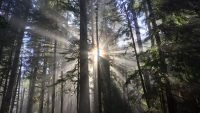Choosing a Greener Death as Your ‘Last, Best Act’
After the sudden deaths of her parents, Environmental Studies professor and author Mallory McDuff confronted her own mortality in a world threatened by the climate crisis.
McDuff embarked on a one-year personal journey, delving into everything from death doulas to green burial and conservation cemeteries. What she discovered about sustainable end-of-life options evolved into her recently published book, “Our Last Best Act.”
Climate, community and cost were the three factors that McDuff weighed as the navigated choices available to her in her North Carolina region.
As an environmentally conscious direct cremation company, we at Solace were curious about McDuff’s experience.
She shared with Solace these tips for those who are looking at less environmentally harmful methods than many conventional funeral homes offer. McDuff says she deliberately did not rank the choices she investigated in her book, understanding that people had many factors to consider in choosing what was right for them.
Talk with your family and friends
“You have to talk about your choices with the people who are going to be implementing them. If you want a home funeral, that’s a discussion that has to be between you and whoever is going to be around when you die.”
McDuff explained in talking with her daughters, it was clear they did not want her to donate her body to a facility that studies decomposition, although that option was appealing to her, for example.
Understand the law in your state
“One thing my dad talked about 40 years ago was that embalming is not required in any state. For some people, embalming is a part of their culture and history, but that culture began in this country during the Civil War to ship bodies back North. The practice hadn’t been with us forever.”
In some states, laws have recently changed to allow newer disposition methods like aquamation (alkaline hydrolysis) and human “composting” (natural organic decomposition), but they are not yet available everywhere.
Ask questions about what’s available
“I just started asking questions and looking around and found out a lot about more sustainable choices. The Funeral Consumers Alliance and Green Burial Council are also good resources. There are a lot of people doing a lot of good work.
Be open to revising plans
“What I learned is that final wishes don’t always have to be final. The choices are evolving and your situation may change, so make sure to revisit your directives.”
Talk about it
“All of these options provide more opportunity for family and friends to be involved on some level in those after-death decisions. For me, that has been a big part of being able to carry the love of the people who have died is being engaged with their bodies.
Like climate change, one of the most important things we can do is talk about death, and in talking about it, it disarms the power death has over us in terms of fear. For me, talking about climate and talking about death became interwoven.”
Learn more about Solace’s commitment to reducing its impact on the environment through our partnership with the Carbonfund.org Foundation.
Mallory McDuff is the author of four books, including her most recent: Our Last Best Act: Planning for the End of our Lives to Protect the People and Places We Love. Her essays have appeared in the New York Times, the Washington Post, WIRED and more. She teaches environmental education at Warren Wilson College in Asheville, North Carolina, where she lives on campus with her two daughters in a 900-square-foot house with an expansive view of the Appalachian Mountains in Western North Carolina.
Photo Gary Peeples
Solace is now Tulip Cremation, the nation’s largest online direct cremation services provider, delivering world-class and compassionate care 24/7.
Proudly providing:
Denver cremation services
Los Angeles cremation services
Portland cremation services
San Francisco cremation services
Seattle cremation services



